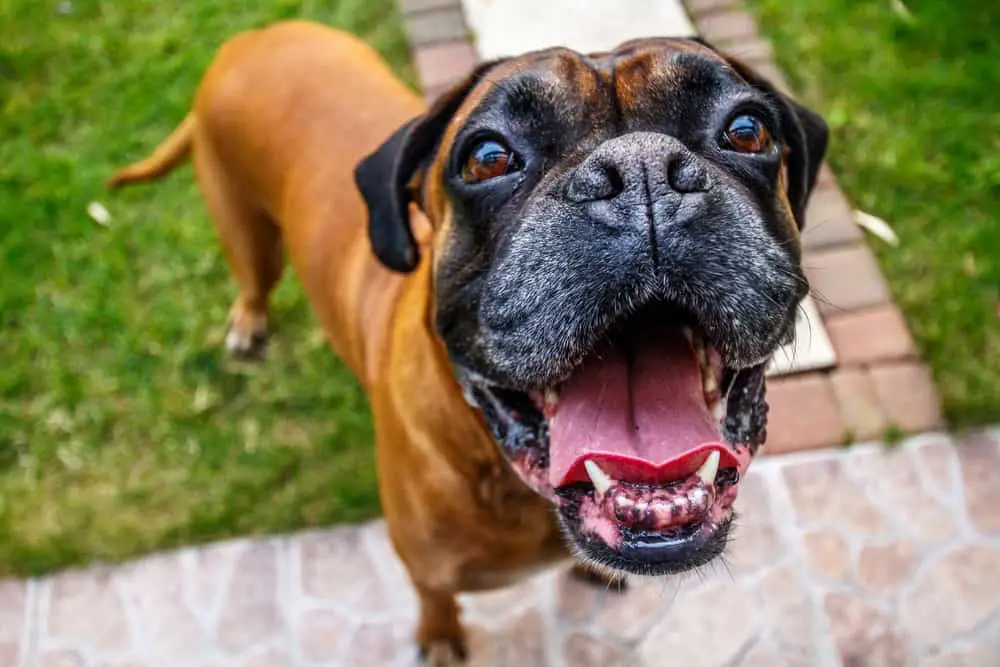Complete Guide To Boxers: Care, Exercise, Grooming and More
With a sometimes silly personality, the Boxer is a strong and athletic dog that is always ready for play. The Boxer likes to please his family, and this attribute makes him fairly easy to train, although this breed does tend to have a stubborn streak. The Boxer is a great dog for any type of vigorous activity or simply snuggling up with his favorite humans at the end of a day as a family pet.
I’ve seen and worked with hundreds of Boxers over my life. Not only have I been a veterinarian for the past 21 years, but I also worked at large dog kennels for years before I became a veterinary student. This article is the summation of my knowledge about the breed.
Table of Contents
How Big Do Boxers Get?
| Height | Weight | |
| Male | 23″-25″ at the shoulder | 65-80 lbs |
| Female | 21″-23″ at the shoulder | 50-70 lbs |
What Can Boxers Look Like?
The coat on a Boxer is short. This fur can make grooming a breeze as this dog is not particularly prone to heavy shedding. The coat can come in a range of colors and patterns, including fawn and brindle. The Boxer sometimes has white markings through the coat. The Boxer often has a mask pattern with its coloration, which can be a black mask or a black mask with white markings.

Although the Boxer does come with a white coat, the AKC has not officially recognized a solid white Boxer. Further, white coloration can sometimes come with genetic mutations that can make the white Boxer undesirable to breeders.
For generations, white Boxers were routinely killed when they were puppies to prevent people from furthering this color pattern or incorrectly associating the breeder with poor breeding stock. Luckily, this practice is largely thought of as unacceptable, and there are white Boxers routinely available for adoption or purchase.
How Long Do Boxers Generally Live?
For a large dog, the Boxer lives a relatively long life, living between 10 and 12 years. Boxer’s average lifespan is about 11 years, while the oldest known Boxer was 16 years old.
Many of my Boxer patients seem to make it to 13-14 years old on average.
What Health Concerns Do Boxers Have?
The most common diseases that can affect any Boxer include:
- Heart Disease (multiple conditions including Boxer Cardiomyopathy and Sub-aortic Stenosis)
- Hip and Elbow Dysplasia
- Corneal Ulcers (ones that are indolent/slow healing)
- Hypothyroidism
- Degenerative Myelopathy
- Cancer (most common are mast cell tumors, lymphoma, brain tumors)
- Gingival Hyperplasia
Check out my article here where I go more in-depth with each of these conditions.
What Is The Best Dog Food For Boxers?
For Boxer puppies, you will need to make sure you don’t feed them too much too fast. It’s easy because they are usually chow hounds, but you want to control their growth. Growing too fast can cause some early bone and joint problems that are easily avoided.
Best Puppy Food For Boxers:
Best Adult Food For Boxers:
Please don’t listen to the folks at the pet store trying to convince you to buy a grain-free diet for your dog. There’s zero science behind that and vets are actually seeing diseases now related to feeding grain-free foods.
What Kind Of Personality Do Boxers Have?
If you are looking for a happy, upbeat, and fun-loving dog, the Boxer is the perfect pet for you. This dog has endless energy and is always ready to meet new people or start a rousing fetch game. By nature, the Boxer is happy and playful, yet they can be protective if they sense a family member could be in danger. For this reason, the Boxer can make a versatile and responsible guard dog.

The Boxer is intelligent, outgoing, and generally a people-pleaser. Because the dog is happy to make his person happy, he is easy to train. Always use positive reinforcement to train your Boxer, and use praise and treats to reward a job well done.
This dog is an incredibly smart breed that can learn new behaviors very quickly if given the proper training and learning environment. Granted, the Boxer has been known to have a bit of a stubborn streak and may challenge an unprepared or inexperienced owner.
A Boxer will be the first breed of dogs to find a loophole in the trainer process and happily exploit a loophole if it makes training easier or if it gets him more treats.
What Kind Of Grooming Do Boxers Need?
With his short fur, the Boxer has relatively minimal grooming requirements. The fur never really sheds too much, and the dog only has significant shedding about twice per year, usually with the changing seasons. Simply brush your Boxer about once or twice per week to remove any loose hairs that will naturally come out of the coat. The best brush to use on the short fur is a grooming glove or a short rubber brush.
The Boxer keeps his fur relatively clean and will only need an occasional bath. Be sure only to bathe the dog when he is dirty. Washing the dog too often can remove the essential oils from his fur, which are needed to keep his fur shiny and healthy.
If the Boxer is not walking over a rough surface during exercise to naturally grind his nails, be sure to keep the nails trimmed about once a month. Keep the Boxer’s teeth healthy and brushed. Professional dental cleanings may be supplemented by brushing at home with a pet-safe toothpaste.
How Much Exercise Does A Boxer Need?
This breed is a high-energy dog that will need a suitable outlet for its energy daily. They will need exercise either on their leash or in a safely secured and fenced area. Boxers will do well to run and chase after a ball or jogging alongside their humans. Keep their exercise session to at least an hour per day, and offer the Boxer plenty of variety, so they do not become bored.

This breed is a very intelligent dog that requires mental stimulation as well as physical stimulation. Be sure to give this dog new behaviors to learn and puzzles to solve. Because the dog is intelligent and learns new behaviors quickly, the Boxer is perfectly well suited for agility competition, obedience training, herding, flyball, and dock diving. Learning a new behavior is fun for the dog and exciting for the owner as well, proving ample bonding time between you and your pup.
The Boxer can work well as a law enforcement dog, performing scent work, or as a therapy dog, helping their human owners navigate spaces. The Boxer was originally bred as a herding dog and performs extremely well with herding responsibilities. The Boxer was originally an all-purpose farm dog who is well-equipped to spend a day working outdoors.
Where Can I Find a Boxer?
If you are searching for a Boxer puppy, it’s a good idea to start with the American Boxer Club. Not only will this offer a list of responsible breeders, but it will also give you the breeders that have agreed to work under the American Boxer Club’s Code of Ethics which prevents the sale or purchase of puppies through pet stores or commercial dealers.
Of course, rescue groups are also a great place to search for a Boxer puppy. A rescue group can not only allow an owner to find a purebred puppy of their choice, but it helps to give a dog a much-needed home. There are many local rescue organizations throughout the country, but you can start with the list of available rescues from the American Boxer Club.
Should I Have My Boxer Puppy’s Ears Cropped?
No. Veterinarians are refusing to do this procedure as it’s unnecessary and for cosmetic purposes only. I’ve never done it and don’t know anyone who does. The Boxer look has been changing such that it’s extremely unusual to find a Boxer now outside of a show ring that actually has its ears cropped.
Special Considerations
- The Boxer by nature, is a bouncy and energetic dog. They were initially bred to herd and chase wild game, which meant they had to be extremely agile. This trait is still inherent in the breed, and young Boxers will spend a great deal of time jumping when they are excited or during play. It is a good idea to teach your young Boxer the command “down” to prevent an excited and playful Boxer from knocking over a small child.
- Although the Boxer is incredibly smart and easy to train, they do have a stubborn streak. Some owners report a very long time for their Boxer to mature, and thus a long time to house train their dog. Usually, it will take about 4 to 7 months to house train your dog fully, but some other Boxers will take significantly longer. Patience and consistency are necessary when house training a Boxer.
- The Boxer generally wants to please his human but occasionally has a stubborn and mischievous streak. The Boxer loves to be the center of attention and can often find himself getting into trouble. Be sure to take this mischief in stride and learn to laugh with your loving Boxer.

One Reply to “Complete Guide To Boxers: Care, Exercise, Grooming and More”
Comments are closed.